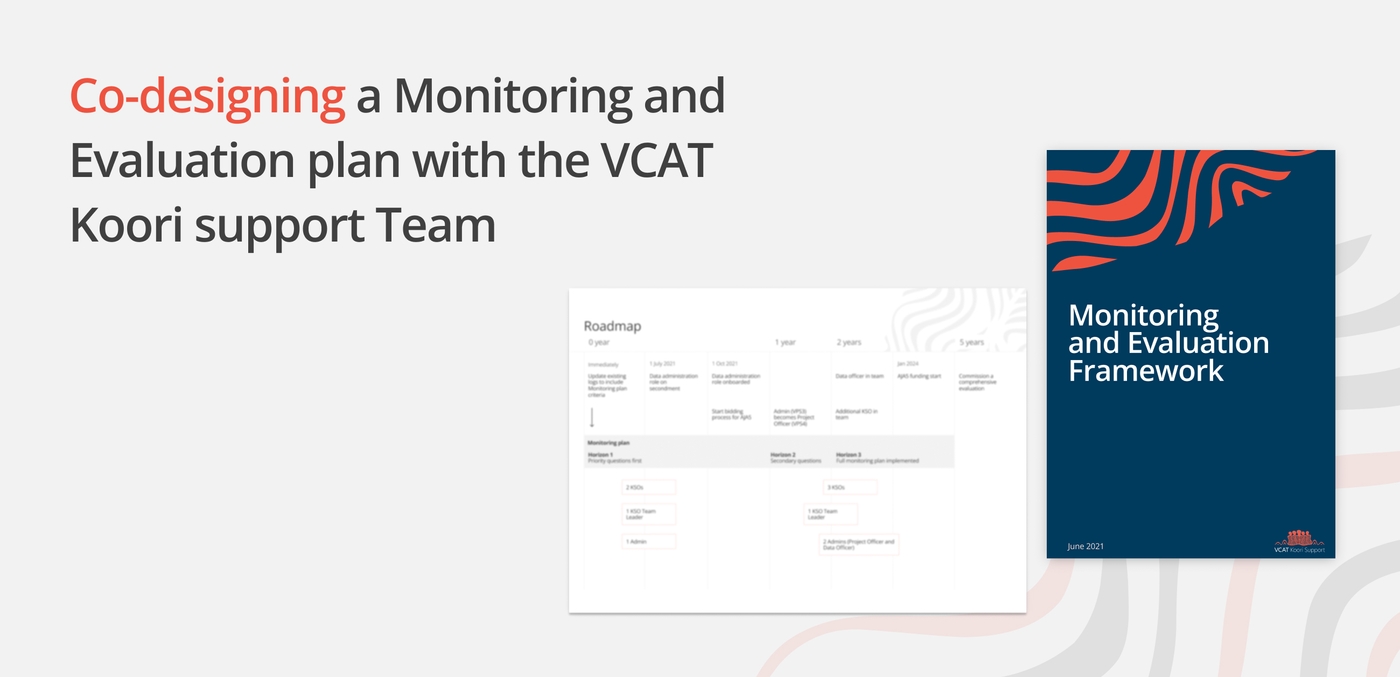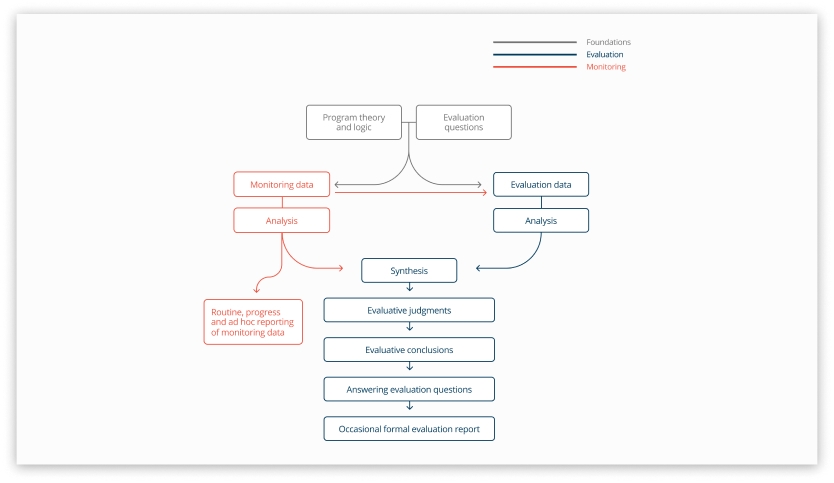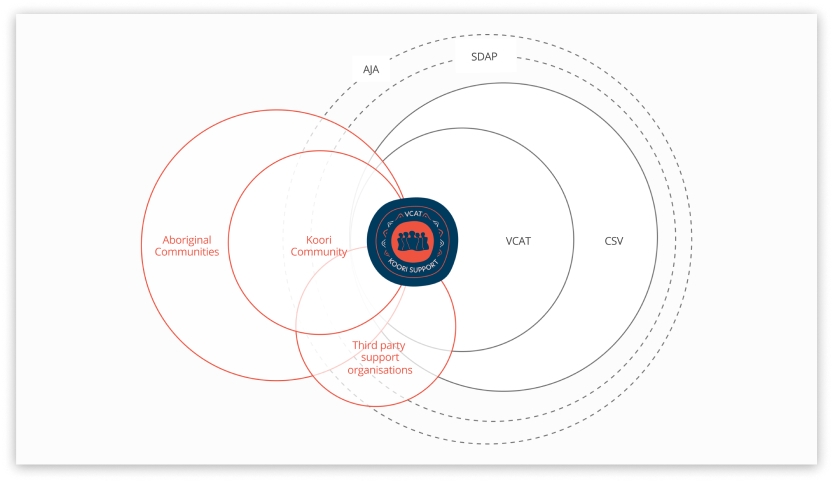
The Koori Support Team was established in early 2020 to help Aboriginal people come to and interact with the Victorian Civil Administrative Tribunal (VCAT). The team is made up of Koori Support Officers (KSOs) with a Team Leader, Koori Support Team Admin Officers and a Manager. It reports to the Executive Director of Services and Legal, who is also co-chair of VCAT’s Koori Reference Group. Portable worked with the Koori Support Team to measure and demonstrate how their work makes VCAT more accessible for Koori people.
Members of the team share a deep understanding of the justice system. They have experience working with the third-party service providers that Koori people deal with. As Koori people working with Koori people, KSOs share this knowledge and experience by providing personalised and empathetic support to clients. They help clients and their families navigate the procedural matters they face during their experience with VCAT.
Portable was first engaged by the Koori Support Team at VCAT in mid 2020. Our first project was to conduct a user experience review of their services as they support Koori people through the VCAT experience.
We continued to work together to co-create a monitoring and evaluation framework that would help the Koori Support Team show how their work actively contributes to their overall goal: VCAT is more accessible to Koori people and can demonstrate it.
This creates a connection between the day-to-day work of the Koori Support Team with several strategic policies, key ones being:
- Burra Lotjpa Dunguludja (AJA4): Under Aboriginal Justice Agreement (AJA) 4, VCAT’s commitments are to increase the number of Koori staff at VCAT as well as to further promote engagement between VCAT and Koori Community members and Koori stakeholder organisations, to help make VCAT more accessible to Koori people.
- Court Services Victoria (CSV) Self-Determination Plan: CSV’s Self Determination Plan outlines a list of initiatives that all strive to achieve a shared goal. CSV’s long-term goal is to ‘build courts and tribunals that eliminate structural and systemic barriers experienced by Aboriginal Victorians’ so that ‘Aboriginal Victorians [can] confidently [access] systems and services that support them to thrive.’
The Challenge
Measuring the impact that daily work has on society-level goals is a difficult task. The Koori Support Team needed a way to measure the impact its work has on helping Aboriginal and Torres Strait Islander people seek access to civil justice.
We needed to end up with a framework that would:
- be easy to start and sustain
- be culturally safe for Koori people
- be ethically safe and respect people’s data privacy
- encourage the Koori Support Team to engage in their own wellbeing and self-care practises
- integrate with existing Aboriginal access to justice strategies
- integrate with future systems underdevelopment at VCAT
- help inform workplace planning and resourcing.
The KSOs felt it is important to avoid reducing members of the team or Koori people to just ‘data’. While numerical data is useful for decision making, people and their stories are just as important to meaningful monitoring and evaluation.
Our approach to combat any unintended consequences of data collection and analysis was to create a set of guiding principles that drives each measurement activity. Collectively, these principles seek to ensure that people are the central concern of the data, technology and legislative systems.
Our Approach
At the outset, Portable knew our role was to facilitate the process for the monitoring and evaluation (M&E) framework to be authored by the Koori Support Team. Therefore, our approach was to support collaboration and structure, with input from stakeholders including VCAT leadership, VCAT Members, the VCAT Koori Reference Group,Court Services Victoria’s Dhumba Murmuk Djerring Unit (Koori Unit) and the Koori Court at the Magistrates’ Court of Victoria. The project was approached in three phases, as outlined below.
Phase 1: The structure
In the first phase, we facilitated conversations with key stakeholders across Court Services Victoria about what key requirements they had from a M&E framework. We played back what we learnt to the Koori Support Team, and together workshopped how to translate what we’d learnt about CSV requirements into a program logic that would meet the needs and goals of the Koori Support Team.

Phase 2: The detail
The second phase focused on the detail within the M&E framework. We spoke to CSV staff to understand and map existing data collection practices within the wider organisation, and learned from how Aboriginal support services were designed at other courts. With the Koori Support Team, we examined the various components of the desired M&E, diving deep into the evaluation questions, ethical standards and data collection methods available and developing these into an actionable framework. We designed how the data Koori Support Team was able to ongoingly capture, store and analyse aligned with the core evaluation goals.
Phase 3: Refining, sharing and launching
With our M&E framework and accompanying program logic ready to share and refine, our combined Koori Support Team and Portable team members presented it to key stakeholders, including members of VCAT’s Koori Reference Group. It was important that we could listen to their feedback and reflect changes in the framework with their guidance so it was representative of our consultation process and the guidance we received.
The Koori Support Team was clear that the M&E framework was not simply about achieving goals, but it was about taking an evidence-led approach, with the Koori Support Team analysing data to create insights informing their stakeholders and users that they are making progress. As such, we identified capabilities to support the Koori Support Team to continue its work towards making VCAT a more accessible service for Koori people and be able to demonstrate it.
Leveraging the strengths and passion of the Koori Support Team, while not adding unnecessary work, would be key to successful implementation. Some evaluation questions require either historical data or a synthesis of multiple data sources to find the right evidence to answer the question.
As well as the M&E framework and program logic, we created a roadmap that would see the Koori Support Team develop and maintain all areas of the framework including data collection, monitoring, analysis, meaningful and contextual evaluation, building capabilities in the team, and working towards creating a comprehensive Evaluation Report in 2026.

Outcomes
Through the M&E framework, the VCAT Koori Support Team are demonstrating how their team and programs are making VCAT more accessible to Koori people.
Program logic is how we think things work. Reality is much messier. Actions can have intended or unintended consequences that we can measure immediately, gradually or only after some time has passed.
The Koori Support Team M&E framework uses a program logic diagram to guide activities to achieve outcomes aligned with the CSV Self-Determination Plan and will:
- build the clearest possible picture of how Koori people experience VCAT
- be more accountable to the community and our stakeholders
- enhance the services we deliver
- maintain a focus on Koori Support Team’s overall goal to make VCAT more accessible to Koori people.
VCAT’s Koori Support Team’s data collection, monitoring and evaluation program has been profiled in a recent Victoria Law Foundation report, ‘Smarter Data’, which holds the outcomes of the work of the team as an example of “improved administrative data, enhancing utility and yielding valuable new insights, ultimately improving both court and tribunal performance and user experience “
Reflections
“The folks in the Koori Support Team at VCAT have an infectious passion and dedication to their role as public service officers. If we’ve managed to capture just a little bit of the energy with which they approach their roles helping people feel heard and respected and able to have their say, I’ll be satisfied. Working with them has been genuinely enjoyable and I’m really really grateful for their openness and guidance.”
– Peter Roper, Senior Content Strategist
Project Team
- Adam Corcoran, Design Strategy Lead
- Tom Morris, Senior Producer
- Aishling Costello, Senior Design Strategist
- Peter Roper, Senior Content Strategist
- Sarah Kaur, Principal Business Designer
- Simon Goodrich, Principal Client Partner